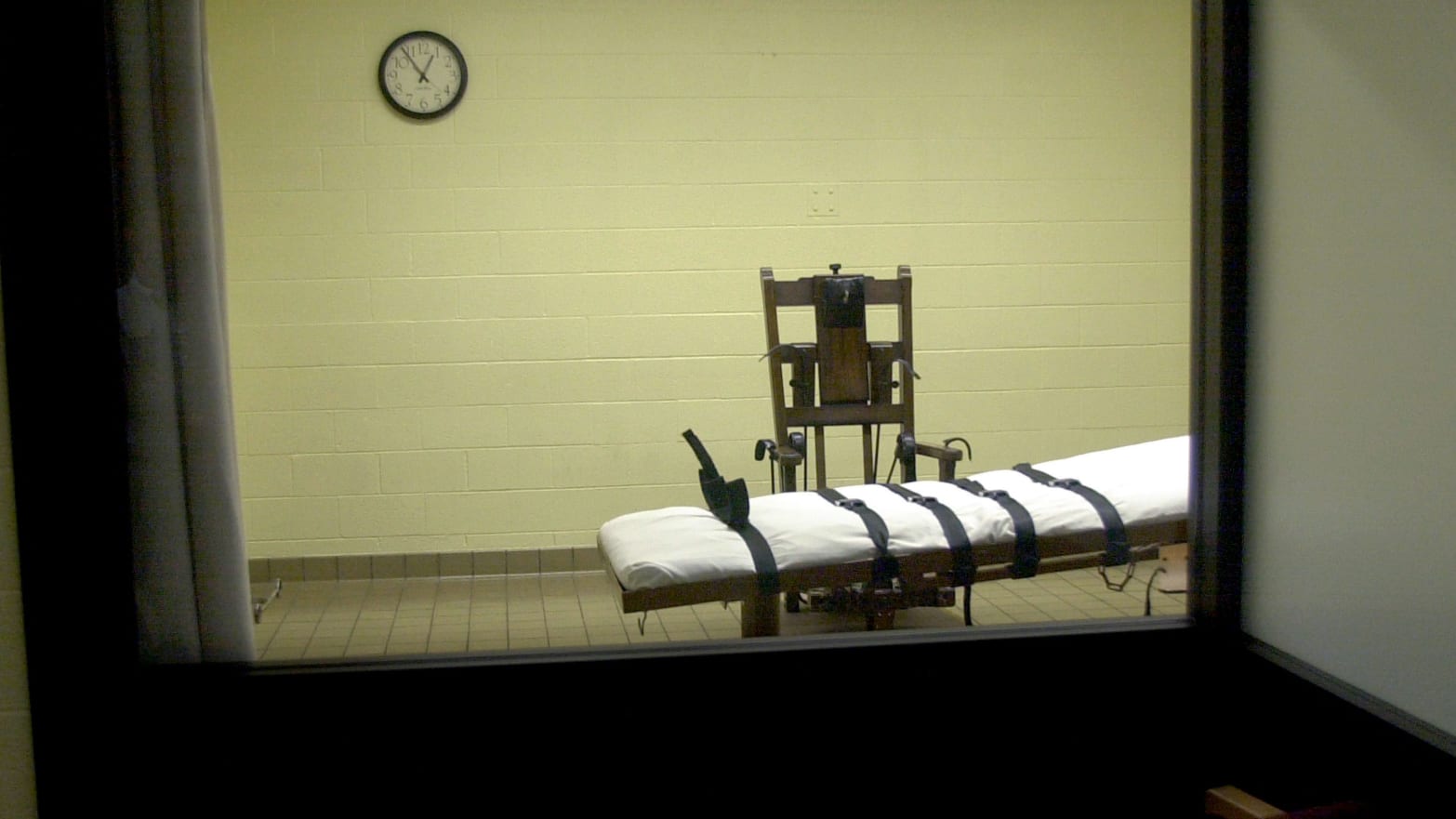LOSING GROUND
Death penalty support is wide rather than deep, even among conservatives in deep red states.
Maurice Chammah DAILY BEAST
Published Jan. 31, 2021

Mike Simons/Getty
Earlier this month, Rep. Ayanna Presley and Sen. Dick Durbin announced a bill to end the federal death penalty. With Democrats in control of Congress and the White House, it’s possible to see the path to passage, as well as a historical irony: President Donald Trump oversaw ore executions than any president in decades, and in doing so he galvanized the left, allowing opponents of the death penalty to link each of these executions to systemic problems, from the all-white jury that sentenced Orlando Hall to the history of trauma and mental illness that marked the life of Lisa Montgomery. In the end, Trump’s zeal for the death penalty may end up paving the way for its demise.
President Joe Biden has promised to eliminate the death penalty, and even without Congress, he can commute the sentences of the 50 people still on federal death row. His attorney general, Merrick Garland, can bar federal prosecutors from seeking new death sentences. The two can order Bureau of Prison employees to dismantle the federal execution chamber in Terre Haute, Indiana, and cart the lethal injection gurney off in a truck. The death penalty has never been given to more than a minuscule fraction of the thousands of people who commit murder each year, but it’s the ideological pinnacle of a punitive criminal justice system, rendering very long sentences lenient by comparison. So the political symbolism of a dismantled death chamber would be potent.
Supreme Court Won’t Kill Death Penalty
IMMORTAL
Mike Sacks

So would the backlash, especially since those on death row include such public villains as Dylann Roof and Dzhokar Tsarnaev. A majority of Americans still support the punishment, and framing the end of the death penalty as a partisan overthrow of Trump’s legacy invites further reversals; a future administration or Congress could, both literally and figuratively, just put the gurney back in the room. And none of this would have an effect on state prisons, where the vast majority of death sentences are carried out. Already, Texas, Alabama, Tennessee, and Ohio have scheduled executions for later this year.
Under Trump, the death penalty appeared to be a partisan wedge issue, but the punishment has been declining in popularity for the last quarter century, in both red and blue states. To understand the choices that politicians on both sides of the issue will face this year, it’s worth revisiting how we got here.
In 1966, death penalty support dropped to 42 percent. At the time, executions seemed like a relic. Electric chairs were gathering dust in storage. Then, in 1972, the Supreme Court ruled that every death penalty law in the country was unconstitutional. Crime was on the rise and Americans believed that unelected judges had robbed them of their ability to fight crime. The film Dirty Harry embodied the era, portraying a police officer hamstrung by case law as he attempted to capture a killer.
By 1994, public support had reached 80 percent, and by the end of the millennium, state prisons were executing more than one person each week. Democrats had more to prove. Around this time, then-Gov. Bill Clinton left the presidential campaign to preside over an execution in Arkansas—of a man who was missing part of his brain, by the way—while then-Senator Joe Biden touted a bill in which “we do everything but hang people for jaywalking.”
The political ground began to shift in 1998, when Karla Faye Tucker was executed in Texas. Having left a pickax in the chest of one of her victims, she had undergone dramatic and, by all accounts, sincere conversion to Christianity while on death row. Gov. George W. Bush did not stop her execution, but he was open about his ambivalence as a fellow born-again Christian. Her death illustrated the conflict between ideals of retribution and redemption.
Around this time, the rise of DNA made it possible to prove that some people on death row were innocent, and newspapers showed images of men and women tearfully reuniting with their families on the courthouse steps. Conservative columnist George Will wrote in 2000 that the death penalty “is a government program, so skepticism is in order.” That year, Republican and Democratic legislators teamed up in Texas to increase funding for public defenders and improve access to DNA testing. Sen. John Cornyn was the state’s attorney general at the time, and he publicly acknowledged that racial bias had infected several death row cases, paving the way for a handful of new sentencing hearings.
“Democrats can attempt a big, quick win, or they can try to bring the trend of conservative opposition from statehouses up to Congress,”
On top of all this, prosecutors—especially in conservative, rural areas—began to acknowledge just how expensive it had become to send someone to death row and framed their turn away from the death penalty in fiscal rather than moral terms.
None of this was enough to seriously crack Texas’ particular cultural attachment to executions, but over time similar arguments about cost, redemption, and mistakes featured prominently in the conversion narratives of conservatives and liberals alike across the country. Republican legislators have recently pushed to repeal the punishment in Utah, Kentucky, Colorado, and Montana, while the Republican governor of Ohio, Mike DeWine, has expressed misgivings. So have more populist conservative thought-leaders like Tucker Carlson, Michelle Malkin, Jay Sekulow, and Richard Viguerie. Death penalty support is wide rather than deep; in 2019, 56 percent of Americans said they favored the death penalty when asked about it in isolation, but 60 percent said they preferred life imprisonment.
Scholars have suggested ways that Biden might promote a bipartisan consensus. Harvard law professor Carol Steiker recently told me the president could create a blue-ribbon commission to study the death penalty, which would ultimately “offer practical grounds to limit or abolish it to those who do not oppose it on principle.” (Obama promised a similar study but never delivered.) Robert Dunham, executive director of the Death Penalty Information Center, suggested that the Biden administration prioritize funding for the defense of military veterans facing the death penalty in state courts, since their crimes can often be traced to PTSD and head injuries from their service. It’s easy to imagine how this might further erode death penalty support on the right.
Democrats will now face a political choice. They can attempt a big, quick win, or they can try to bring the trend of conservative opposition from statehouses up to Congress, setting off a deeper conversation about mercy and rehabilitation that might apply to the broader criminal justice system. The seeds of a reckoning are here; it was Donald Trump who, after signing a bipartisan measure to reduce the federal prison population, announced, “America is a nation that believes in redemption.”
No comments:
Post a Comment